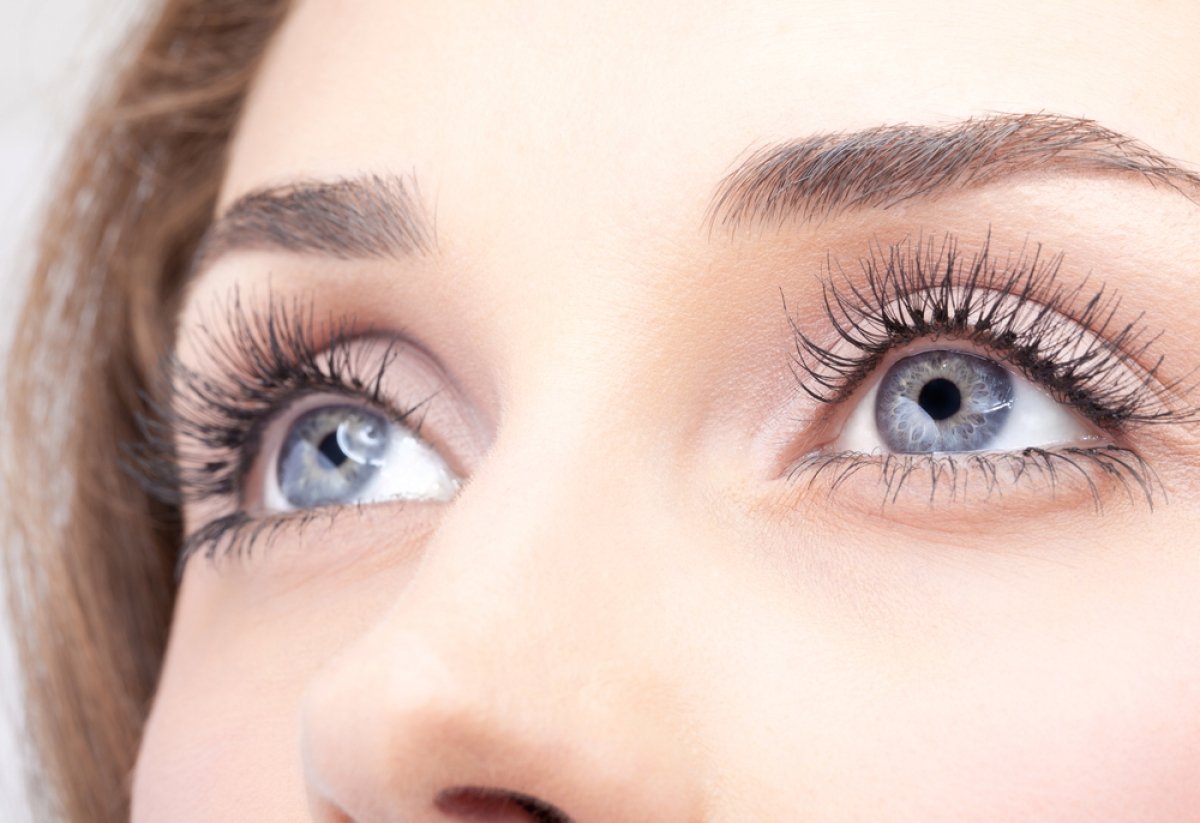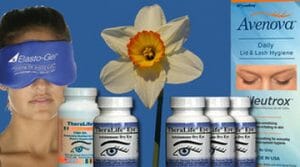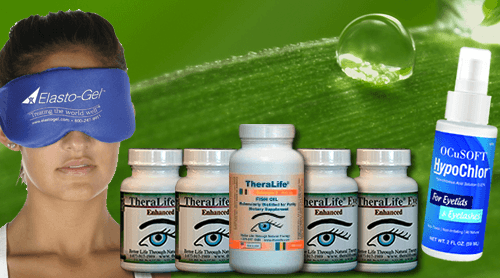All Natural Oral Medication for Ocular Rosacea
Manage Ocular Rosacea – Reduce inflammation and treat your dry eyes.
Best Ocular Rosacea symptoms relief from TheraLife
Talk to a doctor toll free 1-877-917-1989 US/Canada
What is Ocular Rosacea?
Ocular rosacea is a chronic inflammatory condition that primarily affects the eyes.
Characterized by redness, burning, and stinging of the eyelids and eye area, ocular rosacea can be distressing and uncomfortable for those who suffer from it.
Fortunately, some simple home remedies may help alleviate ocular rosacea symptoms.
This article will discuss various soothing solutions that have been found effective in treating this condition.
It will outline potential causes of ocular rosacea and lifestyle modifications, which may also help reduce its severity.
Additionally, readers will learn about different types of topical treatments and other practical tips for managing their cases of ocular rosacea at home.
Understanding Ocular Rosacea- (OR)
OR is an uncomfortable condition characterized by redness and inflammation of the eyelid and surrounding area. It affects approximately 14 million people in the United States alone, with a higher prevalence among women than men.
Treating OR includes antibiotics, topical steroids, and oral medications to reduce the symptoms of this inflammatory skin disorder. However, many individuals are now turning to natural remedies such as herbal teas to relieve their symptoms.
Several potential causes can help select a home remedy when treating OR. Common triggers include:
- Contact lens wear or allergies.
- Environmental factors such as wind or dry air.
- Certain foods like spicy dishes or alcohol.
- Hormonal changes.
- Stress.
- Weather fluctuations.
These can lead to flare-ups of OR if not appropriately managed. Some pre-existing medical conditions may also contribute to developing OR, including diabetes and Crohn’s disease.
Herbal teas are a natural medicine due to their anti-inflammatory properties, which can help reduce swelling caused by ocular rosacea. These teas contain compounds known as flavonoids which possess powerful antioxidant capabilities that can be beneficial in relieving irritation caused by the condition.
Herbal tea blends containing chamomile, green tea extract, ginger root extract, fennel seed powder, licorice root powder, and rose hip powder are often recommended for those suffering from OR as they offer soothing benefits while providing essential nutrients necessary for overall eye health.
By understanding what causes OR and incorporating effective natural remedies into one’s routine, such as herbal teas, patients can manage their symptoms more effectively over time without relying on harsh pharmaceutical treatments or invasive procedures.
The Basics of Ocular Rosacea and Dry Eyes
Rosacea is a chronic skin condition diagnosed and managed by a dermatologist. Rosacea has persistently inflamed skin, particularly in the facial area. Facial redness is the most common symptom associated with the condition. Still, rosacea can cause many more skin-related problems, such as visible facial vessels, chronic pus-filled bumps on the skin, or even an enlarged nose appearance. No exact cause for the development of rosacea has. Specific triggers can cause flare-ups of the disease and make the symptoms worse. Common triggers include warm temperatures and sun exposure, certain foods (most commonly spicy), alcohol, or stress. There is no complete cure for rosacea, making it a long-term battle. However, many dermatologists use prescription antibiotics or facial ointments to lessen the symptoms.
One of the critical symptoms comes from blocked oil glands called meibomian gland dysfunction – from dry eye disease.
Treating dry eyes can reduce OR symptoms. Treatments involve both eye drops and oral medications. Explore these new treatments here.
Since ocular rosacea is an autoimmune disease, oral medications targeted at autoimmune diseases can help.
Causes
OR is a chronic, inflammatory eye condition that can cause redness, itching, burning of the eyes, and facial redness. Understanding what causes OR can help to create more effective home treatments for this disorder:
1. **Dietary Triggers** – Certain foods may trigger or worsen ocular rosacea symptoms, such as spicy food, hot beverages, alcohol, citrus fruits, and dairy products.
2. **Environmental Triggers** – High temperatures, stressors, and changes in weather conditions are all potential triggers for ocular rosacea flare-ups. Sun exposure also increases the risk of developing ocular rosacea due to increased sensitivity in the skin surrounding the eyes.
3. **Hormonal Factors** – Oestrogen levels during puberty or menopause are linked to increased rosacea symptoms, including inflammation of the eyelids and vision problems such as dry eyes or blurred vision.
Taking preventive measures to avoid or reduce these triggers is essential when seeking relief from ocular rosacea at home. Lifestyle modifications such as avoiding direct sun exposure, eating a balanced diet low in inflammatory foods, and managing stress levels can help minimize discomfort caused by this condition.
Lifestyle Modifications
1. Ocular rosacea is an inflammatory condition of the eyes that causes redness, dryness, stinging, and burning.
2. Lifestyle modifications can effectively reduce symptoms and manage ocular rosacea.
3. Avoiding triggers such as spicy food, alcohol, or extreme temperatures can help reduce flares.
4. Eating a healthy diet rich in omega-3 fatty acids and other nutrients can help reduce eye inflammation.
5. Stress management techniques such as yoga, meditation, and deep breathing can help reduce stress and improve overall health.
6. Regularly using artificial tears or lubricating eye drops can help reduce dryness and stinging associated with ocular rosacea.
Avoid Triggers
Many individuals who suffer from ocular rosacea find that lifestyle modifications, avoiding triggers, and practicing self-care, can be just as beneficial to their overall health and well-being.
To start, ocular rosacea sufferers must avoid irritants known to exacerbate symptoms. These include exposure to extreme temperatures or windy conditions; consuming alcohol or spicy foods; smoking cigarettes; taking hot baths or showers; using harsh facial cleansers; wearing contact lenses for extended periods; and spending too much time in the sun without protection.
Practicing certain forms of self-care may also be helpful, such as eating a healthy diet, getting enough sleep each night, and exercising regularly. These measures can help reduce stress levels, improve circulation, strengthen eyesight, and stimulate sebum production – all of which support healthier skin around the eyes.
Overall, minor changes to one’s lifestyle can significantly positively affect those with ocular rosacea.
Healthy Diet
Adopting a healthy diet is essential to lifestyle modifications for ocular rosacea. Eating habits and dietary choices can noticeably impact the condition, as certain foods may irritate or aggravate symptoms while others may help reduce inflammation.
For example, individuals with ocular rosacea should avoid consuming processed foods high in sugar, salt, and saturated fats, as these can increase inflammation throughout the body. Instead, those suffering from this condition focus on eating whole grains, lean proteins like fish and poultry, low-fat dairy products, and plenty of fresh fruits and vegetables.
Additionally, omega-3 fatty acids found in some sources, such as salmon or flaxseed oil, have been shown to provide anti-inflammatory benefits, which could also be beneficial for managing ocular rosacea symptoms.
Ultimately, changing one’s dietary intake can contribute significantly to improved health outcomes related to ocular rosacea.
Stress Management
To effectively manage ocular rosacea, it is essential also to consider lifestyle modifications such as stress management. Stress has been linked to several physical and mental health issues, which can contribute to worsening symptoms associated with this condition.
Developing effective coping mechanisms for managing stressful situations should be part of any comprehensive treatment plan. Mindfulness-based practices like meditation or yoga reduce anxiety levels and provide psychological benefits that may help reduce inflammation caused by ocular rosacea.
Additionally, regular physical activity helps maintain overall physical and mental well-being while providing additional anti-inflammatory effects on the body. Regarding dietary changes, individuals should focus on increasing their intake of vitamins B6 and C since these are known to provide calming effects on the nervous system and promote emotional balance that could prove beneficial when dealing with stressors associated with living with ocular rosacea.
Ultimately, incorporating various strategies into one’s daily routine is necessary for achieving optimal outcomes related to this condition.
Cool Compress Treatments
Excellent compress treatments are one of the most natural and effective remedies for ocular rosacea, providing soothing relief to inflamed skin with minimal effort. As if it were an icy hand on your face, cool compresses can offer tremendous relief from the discomforts associated with this condition.
It is important to remember that when treating ocular rosacea at home, diet changes may also be necessary to ensure long-term success in managing symptoms.
Cold compresses on the eyes help reduce inflammation and redness while restoring moisture balance in the eye area. To make a compress, soak two clean washcloths or cotton pads in icy water and squeeze out any excess liquid before placing them over closed eyelids for 10 minutes – this should be repeated several times daily as needed until irritation subsides. For extra cooling power, try wrapping ice cubes or gel packs inside the cloths before applying them to your eyes – make sure not to leave them on for too long!
In addition to using cool compresses, drinking plenty of fluids throughout the day can help maintain hydration levels in both the body and eyes, significantly improving overall comfort levels associated with ocular rosacea.
Keeping up with dietary changes, such as reducing alcohol consumption and eating more fruits and vegetables, can also promote better healing results over time. Combined with these simple steps, you’ll soon feel much better than ever!
Tea Bag Compress Treatments
Tea bag compress treatments can soothe ocular rosacea symptoms.
Herbal teas like chamomile, green tea, and black tea can treat inflammation of the eyelids from ocular rosacea.
The tannins in these teas contain astringent properties that help reduce redness in the affected area.
To apply this treatment, soak two herbal tea bags in warm water for five minutes before pressing them onto closed eyes for 10 minutes daily.
Rose water is another effective home remedy for relieving discomfort caused by ocular rosacea.
It contains natural antiseptic and anti-inflammatory compounds that aid in reducing swelling and irritation around the eyes.
Applying a few drops of rose water on cotton balls or a clean cloth and gently dabbing it around the eye area can relieve signs associated with ocular rosacea, such as itching, burning sensation, dryness, sensitivity to light, etcetera.
Transitioning into Aloe Vera Treatments, applying aloe vera gel directly to the skin near the eyes may bring some relief from uncomfortable symptoms due to its cooling property, which helps reduce swelling and itchiness.
Aloe Vera Treatments
Aloe Vera Gel has long been used as a natural remedy for ocular rosacea due to its anti-inflammatory and moisturizing properties.
Moisturizing masks such as those containing Aloe Vera can also help reduce symptoms of ocular rosacea by providing additional hydration to the skin.
Aloe Vera gel or moisturizing masks can be applied daily to reduce irritation and redness caused by ocular rosacea.
For best results, consult a dermatologist or health care provider to determine the appropriate amount of Aloe Vera treatments for each individual.
Aloe Vera Gel
Aloe vera gel is a popular home remedy for ocular rosacea due to its anti-inflammatory and moisturizing properties.
Studies have found that aloe vera contains compounds such as polysaccharides and glycoproteins which can help reduce skin redness, irritation, and inflammation associated with the condition.
Additionally, it has been observed that when applied topically, Aloe Vera gel increases hyaluronic acid content in the outer layer of the skin, thus providing protective moisture retention benefits against environmental stressors.
Furthermore, natural oils contained within the plant are known to provide additional hydration and possess antibacterial qualities, which may help prevent further infection or aggravation of symptoms.
As such, incorporating topical applications of aloe vera gel into one’s daily skincare regimen could benefit those suffering from ocular rosacea.
Moisturizing Masks
In addition to topical applications of aloe vera gel, moisturizing masks can benefit those suffering from ocular rosacea.
These masks are designed to provide intense hydration and deliver nutrients deep into the skin layer.
Natural oils such as jojoba oil, almond oil, coconut oil, and avocado oil can be incorporated into these masks to help protect against dryness while providing anti-inflammatory benefits.
Gentle scrubs made with natural ingredients such as honey or oats can also help exfoliate the skin and reduce redness associated with inflammation.
Moisturizing masks and other home remedies may accelerate recovery times for those affected by this condition.
Honey Treatments
Honey has been used for centuries as a natural remedy for many ailments. It is especially beneficial in treating ocular rosacea due to its anti-inflammatory, moisturizing, and antibacterial properties.
The following are three key benefits of incorporating honey into treatments for OR:
1) Honey helps reduce inflammation caused by OR, which can lead to redness and swelling of the eyes, eyelids, and face.
2) Applying honey directly on the skin helps retain moisture, keeping it hydrated while helping repair damaged tissue.
3) Honey masks help soothe irritated skin and offer protection against environmental irritants that could potentially aggravate symptoms of OR.
Using honey as part of an overall treatment plan may be helpful in relieving symptoms associated with ocular rosacea, such as dryness, irritation, and itching. As with any home remedy, caution should be exercised when using honey to treat this condition; individuals should consult their doctor or healthcare provider before beginning any new treatment regimen involving honey products designed explicitly for treating OR.
Transitioning into additional tips for managing OR, these techniques can also relieve uncomfortable symptoms associated with the condition.
Additional Tips For Managing OR
Specific holistic approaches and dietary changes should be considered in managing ocular rosacea.
The first step is to ensure that the area around the eyes is clean and free of makeup or other skincare products. Products with natural ingredients such as chamomile oil may help soothe irritation from rosacea symptoms.
It is also important to avoid environmental triggers like wind, sun exposure, and cold temperatures, which can exacerbate flare-ups.
Certain lifestyle modifications have been found to reduce inflammation associated with ocular rosacea. These include reducing stress levels through yoga and meditation, getting adequate sleep each night, avoiding alcohol consumption and smoking, reducing caffeine intake, and exercising regularly.
Eating a healthy diet rich in omega-3 fatty acids has decreased inflammatory responses caused by ocular rosacea. In addition, taking probiotics helps balance bacteria in the gut to improve overall health.
With proper medical treatment combined with these strategies at home, individuals suffering from ocular rosacea can find relief from their symptoms and prevent future flare-ups from occurring.
Implementing natural remedies into an individual’s daily routine will help alleviate discomfort while restoring balance for the long-term management of this condition.
Frequently Asked Questions
Are There Any Over-The-Counter Treatments For Ocular Rosacea?
Although no over-the-counter treatments are specifically for ocular rosacea, individuals with the condition can reduce symptoms through lifestyle changes and avoiding known triggers.
Avoiding direct exposure to sunlight, reducing stress levels, abstaining from alcohol consumption, and eating a healthy diet may all help manage flare-ups of ocular rosacea.
In addition, gentle cleansers such as those containing non-irritating ingredients like honey or aloe vera could relieve inflammation and irritation associated with the condition.
Is Ocular Rosacea Curable?
Ocular rosacea is not curable, but treatment can help to reduce inflammation and other symptoms associated with the condition.
Treatment typically involves managing lifestyle factors such as eye exercises, dietary changes, and avoiding triggers.
Additionally, topical or oral medications may be prescribed by a doctor in order to control flare-ups of ocular rosacea.
Those affected by ocular rosacea need to follow their doctor’s instructions carefully to maximize the effectiveness of their treatments.
Are There Any Long-Term Effects Of Ocular Rosacea?
You can treat ocular rosacea effectively with dietary changes and stress management, but many people need to be aware of the potential long-term effects that may linger.
Unbeknownst to some, it is not uncommon for those affected by ocular rosacea to encounter lingering symptoms such as eye dryness, redness, itching, burning, or stinging months after treatment has begun.
In addition to these physical manifestations, emotional disturbances such as depression and anxiety may also arise due to decreased self-esteem caused by one’s appearance.
Despite this grim reality, various home remedies have been known to alleviate the severity of symptoms associated with ocular rosacea over time.
Are There Any Natural Remedies For Ocular Rosacea?
Ocular rosacea is a chronic condition of the eyes and eyelids, characterized by redness, irritation, and other symptoms.
Natural remedies for ocular rosacea may include dietary changes such as reducing or eliminating foods that can cause inflammation, like processed sugar and dairy products.
Stress relief techniques such as deep breathing exercises, yoga, mindfulness meditation, or regular physical activity may also be beneficial in managing symptoms associated with ocular rosacea.
Additionally, avoiding sources of dry air like fans or heaters in the home environment may help reduce discomfort caused by ocular rosacea flare-ups.
Are There Any Medications That Can Help Manage Ocular Rosacea?
Patients with ocular rosacea may find relief from medications specially formulated for the condition.
While environmental triggers, such as exposure to wind and cold temperatures, can worsen symptoms, diet changes and certain medications have been found to help manage the disorder.
Common medications doctors prescribe include antibiotics like tetracycline or doxycycline to reduce inflammation; blephamide eye drops, which contain anti-inflammatory agents and antibiotics; and azelaic acid gel or cream applied directly to the eyelids.
Additionally, some patients may be prescribed topical steroid creams or gels if other treatments prove unsuccessful.
Conclusion
Ocular rosacea is a chronic disorder that can cause significant eye discomfort and visual impairment.
Though there are no cures for the condition, treatments exist to help manage symptoms.
Over-the-counter medications may alleviate some inflammation associated with ocular rosacea; however, these should be used with natural remedies such as chamomile tea compresses or cucumber slices placed over closed eyelids.
When combined with professional medical care, these simple home remedies can provide soothing relief and reduce long-term damage to delicate eyesight tissues.
Additionally, prescription medication can be prescribed by an ophthalmologist to treat further any complications caused by ocular rosacea.
With proper management, those affected by this distressing condition can find solace through effective home remedies and live their life generally despite its presence.
References
1.Starr PA, Macdonald A. Oculocutaneous aspects of rosacea. Proc R Soc Med. 1969;62:9-11.
2.Akpek EK, Merchant A, Pinar V, Foster CS. Ocular rosacea: patient characteristics and follow-up. Ophthalmology. 1997;104:1863-1867.
3. Nazir SA, Murphy S, Siatkowski RM, Chodosh J, Siatkowski RL. Ocular rosacea in childhood. Am J Ophthalmol. 2004;137:138-144.
4. Gether L, Overgaard LK, Egeberg A, Thyssen JP. Incidence and prevalence of rosacea: a systematic review and meta-analysis. Br J Dermatol. 2018;179:282-289.
5. Rueda LJ, Motta A, Pabon JG, et al. Epidemiology of rosacea in Colombia. Int J Dermatol. 2017;56:510-513.





